If you’re on the hunt to improve your safari vocabulary, then you’re in luck!
In this guide, discover common safari animal names in African languages. So, no matter where you visit in Africa, you’ll know the local lingo.
Whether Ndebele, Swahili, Shona, Venda, or Zulu, African languages are full of colorful and evocative words that truly capture the essence of the continent’s beautiful wildlife.
Each name holds a story, a myth, or a legend that adds to the cultural heritage of the countries and local people who use it.
Read on and gain a fresh perspective on the deep connection that African people have with the natural world.
As a bonus, there is also a downloadable PDF listing many more African animals.
List of Animal Names in Local African Languages
Ever wanted to find out what the striped zebra is in Ndebele or even the spotted leopard in Zulu?
With the following table, you’ll be able to identify the most common animals of the African bush in local languages.
Translations include Afrikaans, Nama/Damara, Ndebele, Shona, Siswati, Swahili, Tswana, Venda, and Zulu.
While the table is far from complete, it gives a good overview of common African animal names.
Download your FREE table below:
(Right-click and “Save Link As…” to save it to your computer)
—
NB: Some of the names come from Clive Walker’s book “Signs of the Wild”.
This compact field guide to the identification of Southern African mammals based on their spoor, droppings, and skulls is widely accepted as the standard work on the subject.
This edition offers up-to-date information on identification through signs.
Highly recommended!
Learn Shona, Zulu, and Ndebele Animal Names, Etc.
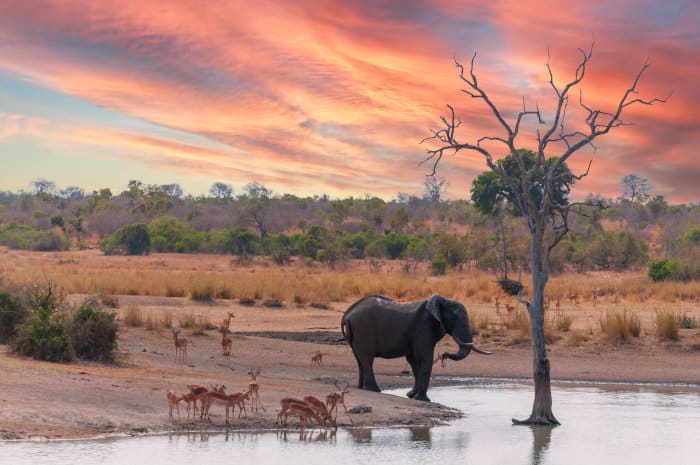
For those wanting to dive a little deeper, let’s take a look at some of Africa’s most beautiful animals.
Whether it’s the majestic lion, elusive leopard, or mischievous vervet monkey, you’ll leave with a wealth of knowledge surrounding their African names.
Giraffe
Afrikaans: Kameelperd
Ndebele: Htundla
Shona: Twiza
Siswati: Indlulamitsi
Swahili: Twiga
Tswana: Thutlwa
Venda: Thuda
Zulu: Ndhlulamithi
Fun fact: The Ndebele language is split into two—Northern Ndebele (spoken primarily in Zimbabwe) and Southern Ndebele (spoken in parts of South Africa). The two have minor differences.
So, while the giraffe in Ndebele in South Africa is “Htundla”, it is also known as “Intundla” in Zimbabwe.
Elephant
Afrikaans: Olifant
Ndebele, Siswati, Xhosa, Zulu: Ndhlovu
Shona: Nzou, Zhou
Swahili: Ndovu
Tswana: Tlou
Venda: Ndou
Fun fact: ‘Elephant’ in Ndebele, Siswati, Xhosa, and Zulu is “Ndhlovu”. This is also a popular Zulu clan name (often spelled “Ndlovu”). Learn more African elephant facts.
Lion
Afrikaans: Leeu
Ndebele: Isilwane
Shona: Shumba
Siswati: Ngwenyama
Swahili: Simba
Tswana: Tau
Venda: Ndau
Zulu: Ngonyama
Fun fact: Lion in Zulu—ngonyama—means “the master of all flesh”. The animal is also referred to as “ibubesi”, which comes from the verb “bhubeza” meaning ‘to make the final decision’.
This suggests that the lion is, without a doubt, the king of the jungle (or savanna).
Buffalo
Afrikaans: Buffel
Ndebele: Inyathi
Shona, Swahili: Nyati
Siswati: Inyatsi
Tswana, Venda: Nari
Zulu, Xhosa: Nyathi
Fun fact: A buffalo is one of Africa’s most dangerous animals, according to hunters and African locals. A herd of Cape buffalo is capable of fending off a pride of lions, earning them a spot in the Big Five.
Their strength is also the origin of many hunting myths and legends.
Leopard
Afrikaans: Luiperd
Ndebele, Siswati, Venda, Xhosa, Zulu: Ngwe, Ingwe
Shona: Mbada
Swahili: Chui
Tswana: Nkwe, Inkwe
Fun fact: Now you know what a leopard is in African languages—but did you know that the Zulu people refer to the leopard (or “ingwe”) as a totem animal?
To them, the large cat symbolizes courage, power, and nobility. As such, leopard skin is often worn by Zulu royalty.
Hippopotamus
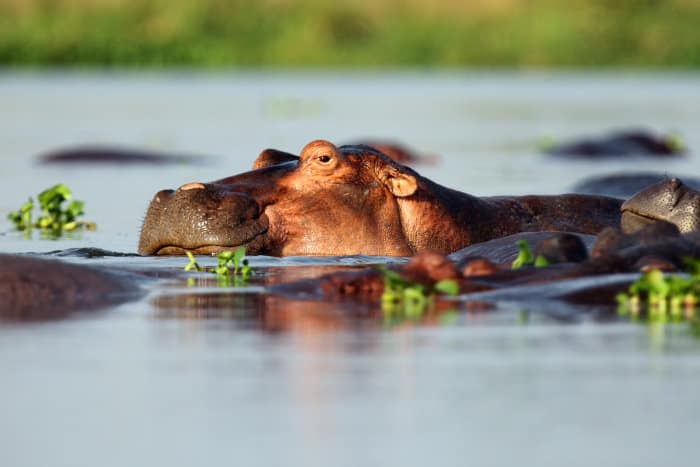
Afrikaans: Seekoei
Ndebele: Imvubu
Shona: Mvuu
Siswati, Zulu: Mvubu
Swahili: Kiboko
Tswana: Kubu
Venda: Mvuvu
Fun fact: African people know the hippopotamus to be a symbol of unruliness. The Tswana people refer to a hippo as “kubu”, which means rebellion or rebelliousness.
Additionally, hippo in Setswana is “kubuga”, meaning “sudden awakening”.
Black rhinoceros
Afrikaans: Swartrenoster
Shona: Chipenbere
Swahili: Faru
Tswana: Tshukudu
Venda: Thema
Xhosa: Umkhombe
Zulu: uBhejane/Ubejane
Fun fact: Locals view rhinos as a symbol of gentleness and peace. However, one should not get confused—these large animals are still dangerous out in the wild.
White rhinoceros
Afrikaans: Witrenoster
Shona: Chipembere
Swahili: Faru
Tswana: Tshukudu
Venda: Tshugulu
Zulu: uMkhombe
Fun fact: The white rhino’s name comes from a mistranslation of the Dutch word “wijd”, meaning wide, in English. This name referred to the rhino’s wide mouth.
Cheetah
Afrikaans: Jagluiperd
Ndebele, Zulu: Ihlosi, Hlosi
Shona: Dindingwe
Siswati: Lihlosi
Swahili: Duma
Tswana: Lengau
Venda: Dagaladzhie
Xhosa: Ingwenkala
Fun fact: The cheetah’s name is not from Africa. It comes from the Sanskrit word ‘citra’, which means “spotted one”. To learn more about this animal, check out these incredible cheetah facts.
Blue wildebeest
Afrikaans: Blouwildebees
Ndebele, Xhosa, Zulu: Nkhonhoni
Shona, Siswati: Ngongoni
Swahili: Nyumbu
Tswana: Kgokong
Venda: Khongoini
Fun fact: African locals view the wildebeest highly. Zulu people use the word “Nkhonhoni” to describe a champion or leader.
Burchell’s zebra
Afrikaans: Bontsebra
Ndebele: Idube
Shona: Mbizi
Siswati: Lidvubu
Swahili: Punda milia
Tswana: Pitse ya naga
Xhosa, Zulu: Dube
Fun fact: The “quagga” is a subspecies of zebra that inhabited the plains of South Africa. The Khoikhoi people gave the animal its name because of the sound it makes, described as “kwa-ha-ha”.
Spotted hyena
Afrikaans: Gevlekte hiëna
Shona: Bere
Siswati: Mpisi
Swahili: Fisi
Tswana: Piri/Phiri
Venda: Phele
Zulu: Mpisi
Fun fact: Despite its bad reputation, its Zulu name suggests otherwise. Often used by South Africans, “mpisi” means “the purifier”, “the cleaner”, and “the one who makes things orderly”.
Eland
Afrikaans: Eland
Ndebele: Impofu
Shona: Mhofu
Siswati: Impophi
Swahili: Pofu
Tswana, Venda: Phofu
Xhosa, Zulu: Mpofu
Fun fact: Eland in Zulu is “mpofu”, which means “the light-skinned one”, “the golden-skinned one”, and “the humble one”. The eland is also one of the most frequently painted animals among tribes in southern Africa.
Know Shona Animal Names and More on Your Next Safari
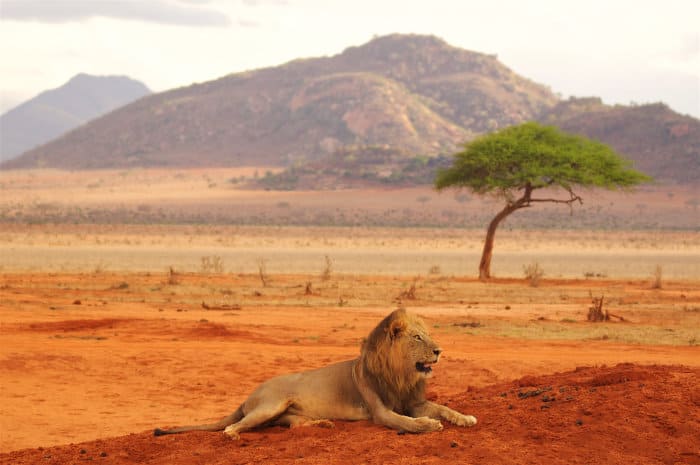
So there you have it—a list of safari animal names in Zulu, Shona, Ndebele, Venda, and plenty of other African languages. By taking the time to learn some of the names above, you’re sure to amaze your fellow safari-goers on your next trip.
Whether you’re asked what’s a lion in Ndebele, springbok in Tswana, or any other wild animal name in Zulu, you’ll have the answer along with some extra facts to boot.
So what are you waiting for? Check out these safari deals and start planning your African adventure.
PS: Do not forget to download the PDF; it’s sure to come in handy. Or, review this guide on Swahili animal names.
Until next time, have a “mirabulous” day.
Michael (aka Africa Freak)
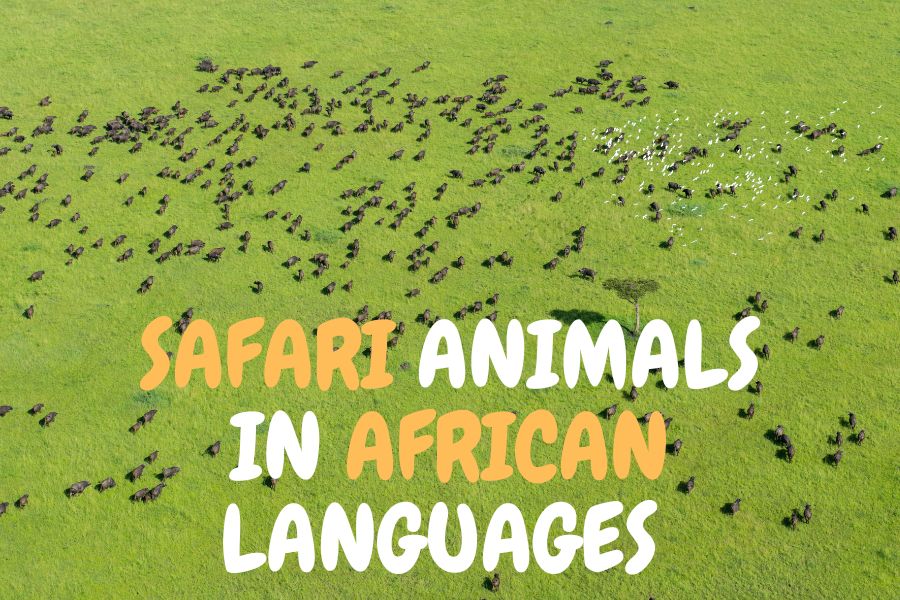

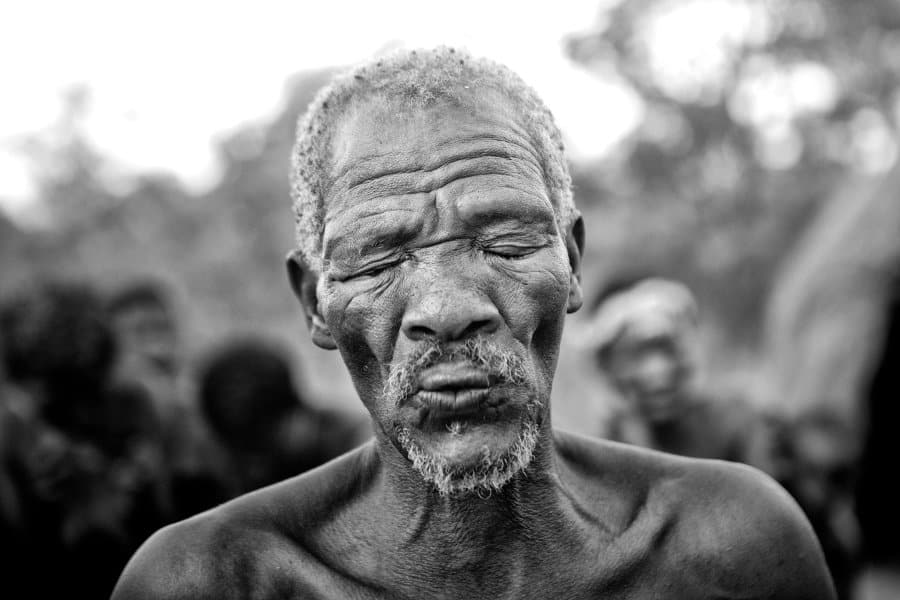
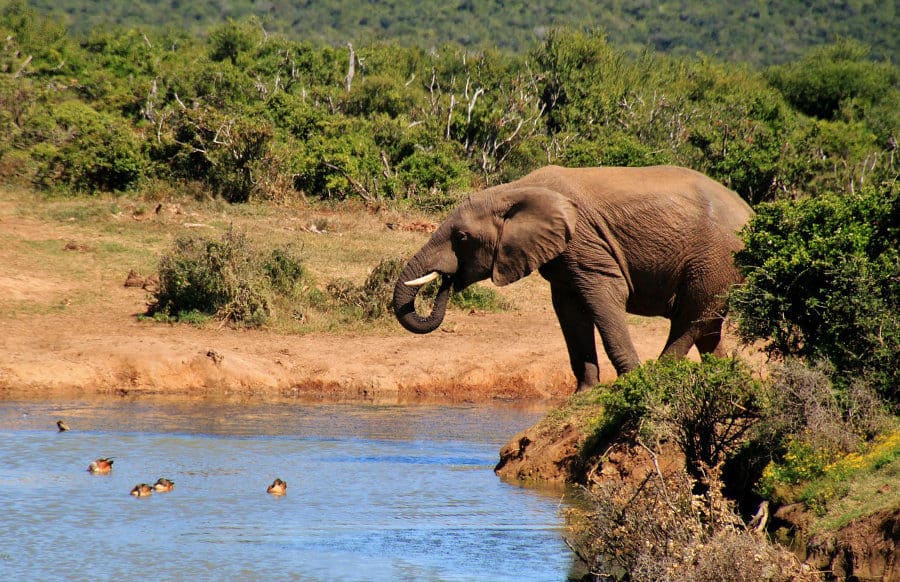
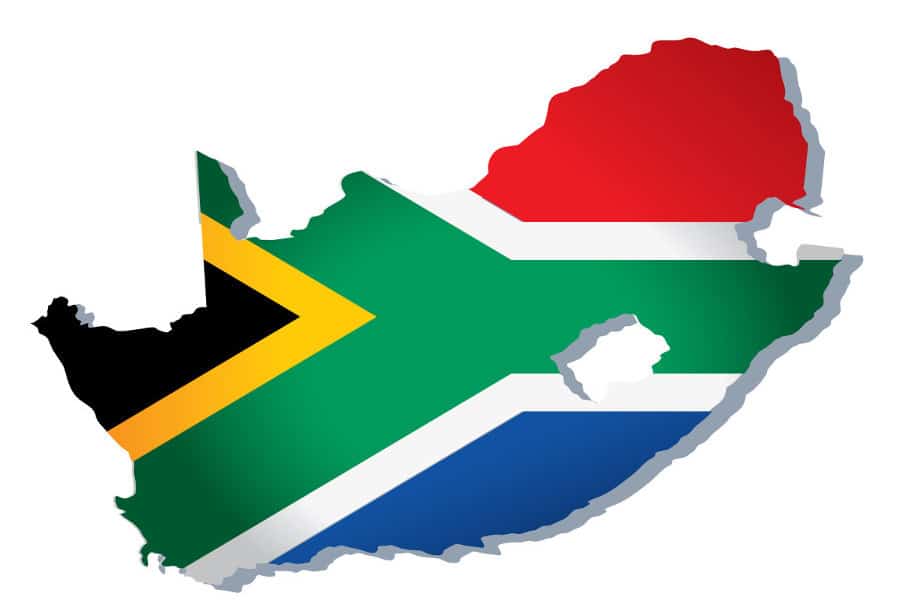
I have been given the privilege of naming 2 baby cubs in the Kgalagadi. Do you have any knowledge of appropriate names for the area & the word must start with M. Quite a task as I don’t see many M words in Khoisan or Twana language.
That’s a tough question, Linda! 🙂
What kind of cubs are you referring to (lions?)?
Here’s 100 Khoisan words to get you started:
http://www.sscnet.ucla.edu/history/ehret/Khoisan100word.pdf
Some of them which you may find useful include magadza (“long” in Sandawe), mtana (“good” in Hadza), manjano (“yellow” in Sandawe), or even malundi (“cloud” in Hadza).
There’s also words like mana (“meat” in Hadza), maxa (“man” in Sandawe), ma (“to give” in Khoekhoe), mu (“to see” in Khoekhoe), and manaa (“to know” in Sandawe).
I hope this helps! 😉
I’d be very grateful if you could tell me the Zulu words for the following creatures, please?
Grey Duiker
Woodland Dormouse
Rock Hyrax
Side-Striped Jackal
Slender Mongoose
Water Mongoose
Red Hartebeest
Nyala
Hi Martin,
Thanks for your comment.
Not sure about “woodland dormouse” (perhaps someone else can help out?), but here’s the rest of your list in Zulu:
Common duiker = Mpunzi
Rock hyrax (dassie) = Mbili
Side-striped jackal = Mpungutshe
Slender mongoose = Chakide
Water mongoose = Mvuzi
Red hartebeest = Nduluzele
Nyala = Inyala
Hope this helps, take care! 😉
Michael
What is a wild pig in Ndebele?
Bushpig in Ndebele is “ngulugunda”.
Ingulungundu
This is a very valuable site!!
What is the name for rabbit & hare In Zulu?
Thank you for your help.
Hare in Zulu is “logwaja”!
Rabbit in Zulu is “unogwaja”!
Hope this helps! 😉
I love this! I could have used it during my last trip through Kenya. Thanks for sharing this info.
Hey guys! 🙂
Thanks a million for the kind words, it’s always nice to hear that your work is appreciated! 🙂
I must admit some of the animal names are “impossible” to pronounce… and I had to read them a couple of times before I could spell them correctly. 😉
Btw, if anyone can fill in some of the blanks, please be my guest! 🙂
Oh, and yeah, just thought I’d add a couple more translations just for the fun of it. Here it goes:
Some of my Antelope favs! 🙂
Bushbuck
Afrikaans: Bosbok.
Sotho: Tshoso.
Ndebele, Zulu, Swazi, Xhosa: Imbabala.
Shona: Dsoma.
Shangaan: Mbvala.
Venda: Mbavhala, Tshishosho.
Lozi: Mbabala.
Tswana: Serolobotlhoko.
Yei: Ungulungu.
Nama/Damara: !Garapiris.
Nyala
Afrikaans: Njala.
Shona: Nyara.
Siswati: Litagayezi.
Ndebele, Zulu, Shangaan, Venda: Inyala.
Kudu
Afrikaans: Koedoe.
Zulu: Mgankla.
Xhosa: Qudu.
Shangaan: Hlongo.
Siswati: Shongololo.
Sotho, Venda, Tswana: Tholo.
Shona: Nhoro.
Ndebele: Ibhalabhala.
Lozi: Tolo.
Yei: Unzwa.
Nama/Damara: Xaib.
Springbok
Afrikaans: Springbok.
Herero: Menyeh.
Tswana: Tshephe, Maponye.
Sotho: Tshephe.
Nama/Damara: || Gûb.
Source: Signs of the Wild, by Clive Walker.
Cheerios! 🙂 😉
Kudu is shongololo? In Siswati?
Yes, funnily enough! 🙂
Great post! I frequently get travelers interested in learning some Swahili or at least interested in the language before taking their trip to Africa. This PDF is a great way to familiarize yourself and your family with the animals of Africa and the culture of Africa before leaving for your trip!
It’s also exciting and highly rewarding to learn a new language–even if it is just a few words!